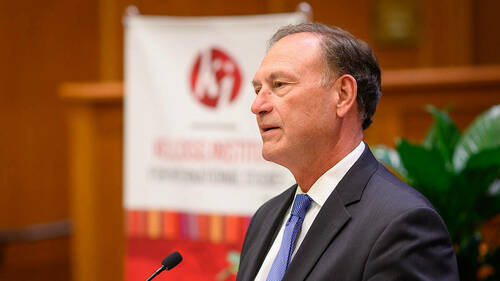
U.S. Supreme Court Associate Justice Samuel Alito Jr. on Thursday (Sept. 30) dismissed “silly” criticisms of the United States Supreme Court’s use of a method for fast-tracking urgent cases, including its recent refusal to block a Texas ban on most abortions after six weeks of pregnancy.
Alito’s nearly hour-long speech, titled “The Emergency Docket,” was presented by the Kellogg Institute for International Studies and its Constitutionalism and the Rule of Law (CAROL) Lab, and co-sponsored by the Notre Dame Law School.
The emergency docket allows the court to make decisions quickly when necessary and has been demonized for political reasons, Alito said during a speech at the University of Notre Dame’s McCartan Courtroom. He said the rise of a new nickname coined in a 2015 law review article — “the shadow docket” — is partly to blame for misperceptions and criticism surrounding the court’s use of the emergency docket.
“The catchy and sinister term ‘shadow docket’ has been used to portray the court as having been captured by a dangerous cabal that resorts to sneaky and improper methods to get its ways,” he said. “This portrayal feeds unprecedented efforts to intimidate the court or damage it as an independent institution.”
His comments came a day after the Senate Judiciary Committee held a hearing on the process, with Democrats attacking it as ideologically driven.
The shadow docket allows the court to bypass oral arguments and the normal deliberative process, and has been criticized as lacking transparency. But Alito, one of the court’s most conservative justices, said that rulings on emergency applications are “nothing new” and the number of such cases to come before the justices has increased in recent years.
He cited several recent cases where the court’s review of emergency applications has drawn attention, including its lifting of a Centers for Disease Control ban on evictions during the coronavirus pandemic. The justices also ruled in the summer against the Biden administration’s efforts to roll back a Trump-era order requiring migrants to remain in Mexico pending completion of their removal hearings.
Alito dismissed “false and inflammatory” claims that the court’s 5-4 decision on the Texas abortion law amounted to an overturning of Roe v. Wade, the 1973 Supreme Court decision that made abortion legal in the U.S.
“We did no such thing and we said that expressly in our order,” he said. The Texas law went into effect last month.
He gave a 10-point rebuttal of criticisms of the emergency docket, dismissing as “rank nonsense” the allegation that the Supreme Court issues its rulings in the middle of the night to avoid attention from reporters and the public. He said that, often with only hours to make a ruling, the court may not have time to hear oral arguments, but its processes — aside from private deliberations — are fully transparent.
“We do the best we can under the time constraints imposed by this situation,” he said, comparing the court’s work in such cases to emergency room treatment.
Without citing specific names, Alito blamed politicians as well as the media for portraying its expedited rulings, which often come without full opinions from the court, in a negative light.
“Journalists may think that we can just dash off an opinion the way they dash off articles,” he said, but “when we issue an opinion, we are aware that every word that we write can have consequences, sometimes enormous consequences, so we have to be careful about every single thing that we say.”
Alito is the second Supreme Court justice to visit Notre Dame in recent weeks. Justice Clarence Thomas delivered the 2021 Tocqueville Lecture on Sept. 16. Another justice, Amy Coney Barrett, is a 1997 graduate of Notre Dame Law School and served as a professor of law for several years.
Kellogg Institute Director Paolo Carozza, a law professor at Notre Dame, said Alito has been in dialogue with Kellogg about issues in the field of comparative constitutional law for nearly a decade.
During his visit to Notre Dame, Alito met with both undergraduates and graduate students and Notre Dame faculty. He also provided advice to principal investigators with the CAROL Lab, one of several Kellogg labs that support high-impact, high-yield research while bridging scholarship and policy. The Kellogg Institute specializes in interdisciplinary research on democracy and human development.
The CAROL Lab engages civil society actors, national political bodies and international organizations by advising on matters of constitutional development and reform, democratic institutions and the rule of law.
“With one of its primary aims being to convene and engage apex court judges from around the world, CAROL is fortunate to be able to attract the interest of one of the justices of the U.S. Supreme Court,” Carozza said.